This is an abridged excerpt from a “lost” interview conducted by Jo Confino (working for the Guardian at the time) in 2012 with Thay at the Toadskin Hut in Son Ha Temple. The entire interview is available on the Plum Village Podcast, “The Way Out is In,” episode #47 aired on 21 March 2023. Join us on April 5 in London for the Live podcast with Br. Phap Huu.
Jo Confino: I have been looking at issues like climate change and the fact that last year, there has been very bad weather, extreme weather, lots of other problems as a result of climate change and the destruction of the environment. And yet, it seems like not many want to act. What is your thought on this?
Thay: Not many seem to be acting on the climate, but they are also not acting on many other things.
They have many problems: their relationship with themselves, their relationship with another person, their family. They don’t act on those problems either. So, it’s easy to see how they don’t want to act on the environment. If we expect them to do something about the environment, it might be too much; because they still are not doing the most necessary things: like understanding themselves, taking care of their suffering. They are afraid of thinking about their own suffering, their own problems. Why would they have the courage to think about the suffering of the Earth or the environment? So, that is the attitude of many. We are afraid. We don’t want to see the truth.
Jo Confino: And if they saw the truth, what impact would it have?
Thay: When they see the truth, it could be too late to act. Yes, I think that is true. People like yourself, would like to wake them up, but they don’t want to get up because waking up makes them suffer. So they continue to dream in order not to suffer. They are not strong enough to confront the truth. It’s not that they don’t know what is going on. They don’t want to think about it. They want to be busy in order to forget. It’s not because they like what they do so much that they are busy. They need to be busy in order not to think about the real situation.
Jo Confino: Do you think we’ll need a real disaster to wake people up? Or do you think that will make people hide even more? What do you think might change the balance?
Thay: If you show them the truth, if you bring them a film or something with evidence to convince them that the situation is urgent, they might have some time to look at it. But after that, they’ll go back to the way they were because they don’t want to think about it. It is not because they are not intelligent enough to know what is happening.
I think there are other approaches, like showing them another kind of reality. Show them a person who is happy, who lives relaxingly. That person does not need a lot of money or power or anything to be happy.
We try to make them experience a little bit of that kind of happiness. If they can taste the happiness of relaxation and peace, then maybe they will change. They will see that it’s not worth continuing on this path of money and power.
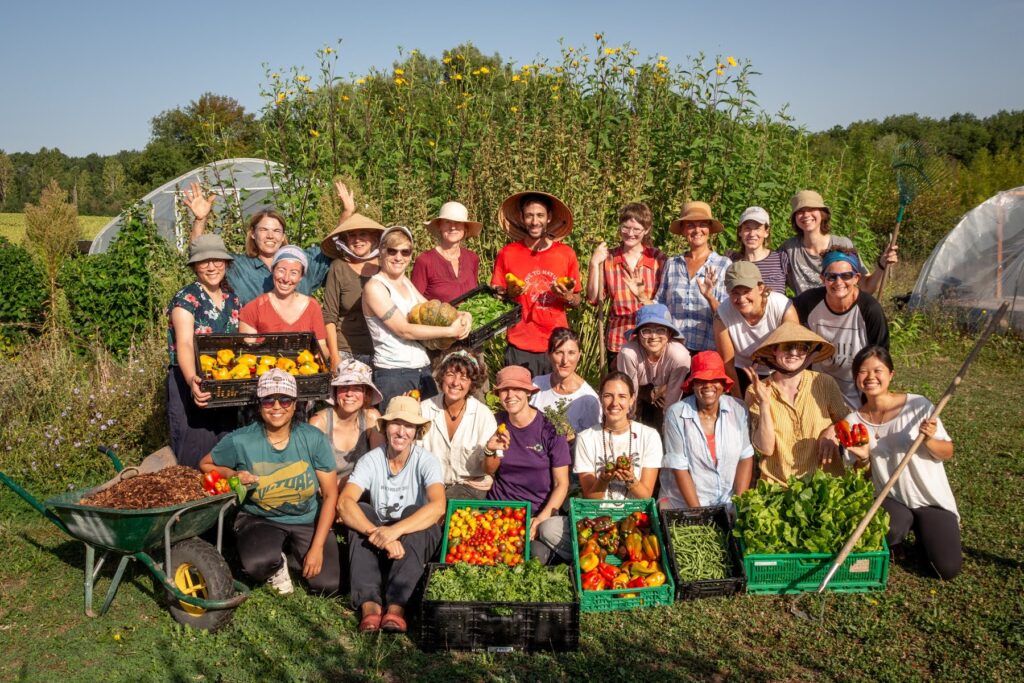
“So bring them to a place where there is happiness; bring them to meet a person who is truly happy.”
That is their chance, because they think that there’s no other way than the way they are going. You have to show people happiness like that, to bring awakening. And we need people who know how to be truly happy in order to show them.
Jo Confino: You also talk about fearlessness, about the courage to stand up. What helps people to find that courage to stand up, even at the risk to themselves?
Thay: You have the courage to do it, because you have enough compassion. Compassion is a very powerful energy. Without compassion, you cannot do it. With compassion you can die for other people, like a mother who can die for a child. Compassion is possible when you understand the suffering. You also have insight, because compassion is born from insight; because of our insight into suffering, and also insight into happiness, you have the courage to do it, to say it, because you are not afraid of losing anything. You are not afraid of losing fame, your status, because you know that that is not the foundation of your happiness.
The foundation of your happiness is understanding and love. So, if you have that insight and you live by that kind of insight, you are not fearful anymore.
But if you still have fear of losing your status, your position, your house, and so on, you will not have the courage to do it. If you have experienced some happiness, like love, understanding, you know that happiness does not come from these outer conditions. We know that happiness comes from our mental insight. You know how to be happy. You know how to recognize the real conditions of happiness that you have. Then you are not fearful anymore. We have to learn to live like that, without fear. We have to be strong enough. We have to have the power of love, the power of giving up all these things, and the power of understanding. These three kinds of powers are not dependent on money or status or things like that. The power to love, the power to be able to cut off these sorts of actions, the power to understand our suffering and the suffering of the other person. These are cultivating true powers.
Jo Confino: What’s the best way of communicating to people so that it really creates change amongst a lot of people rather than just a few?
Thay: Suppose you write a book on the art of consumption, because people spend money and buy a lot of things every day. You can speak in the kind of language that can help people to wake up to see that what they buy cannot make them happy. Many people consume in order to cover up their suffering. That does not help, because during the night, these kinds of things come up and they suffer in their own hell. So, tell them how to consume and what to consume, so that they can heal. They can have a little bit more peace and love.
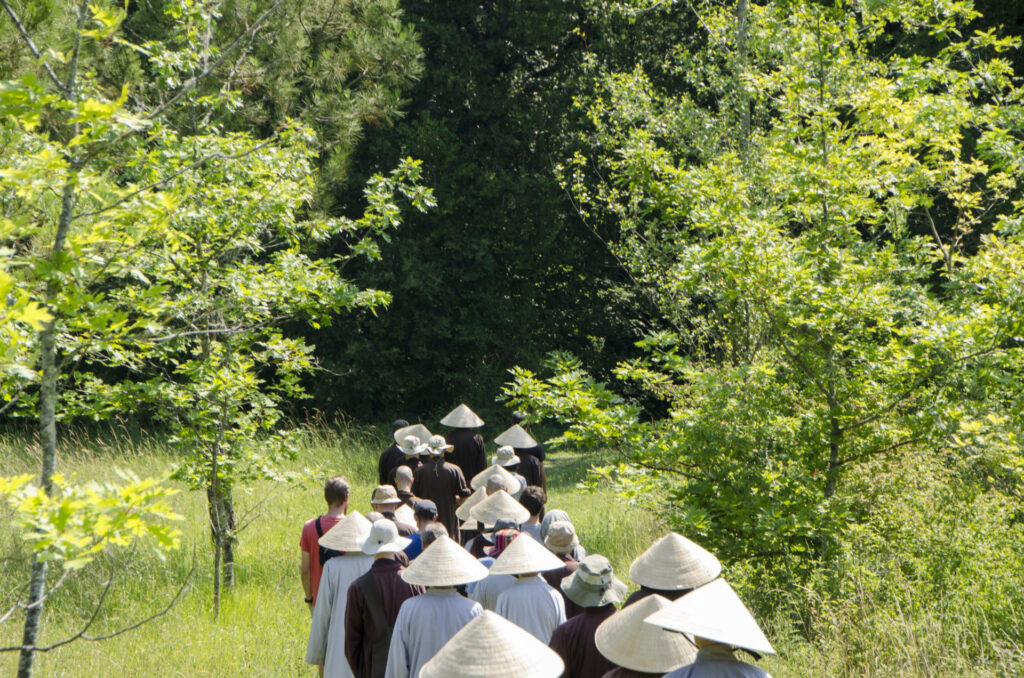
When we do walking meditation, we consume time. In the context of modern civilization to walk like that is a waste of time. You don’t do anything. You don’t talk, you don’t think, you just walk. It’s a waste of time. Time is money. But for us, this is good consumption, because we allow our body to relax, our mind to relax, to rest.
In every step, we touch the wonders of life, the refreshing and healing elements of life. That is good consumption. After half an hour of walking like that, you feel refreshed, restored. That does not need a lot of money. It does not need anything at all. We are not against consumption. So, tell them how to walk from the parking lot to the place where they work. To walk in such a way that every step can restore their peace, their joy, and their love for life. Teach them how to stop their thinking.
Jo Confino: A lot of people I speak to say there’s a disconnection between people’s lives and the impacts of their lives. So, you buy something and you don’t know where it comes from. You don’t know who produced it. You don’t know the conditions of those people. They’re so isolated from the world around them. And whatever they do, they don’t see the impact. Do you think there’s a problem with the fact that people live their lives, but they’re so disconnected?
Thay: So, in that book, “The Art of Consumption”, you tell them how to eat: the art of eating. Instead of thinking and talking a lot, you stop talking. You stop thinking and you try to eat properly. You look at the food. You get in touch with the piece of carrot, and you get in touch with the soil, the water, the rain, the sunshine. You get in touch with Mother Earth. You eat in such a way that you feel in touch with true life, your roots. That is meditation, and the meditation is very pleasant.
You have a habit of eating and you should be shown another way of eating, so that you can see how a piece of carrot has come to you.
At the beginning of our meal, we read the Five Contemplations. But during our meal, we contemplate it; not just at the beginning. While stopping the thinking, we chew every morsel of our food in that way. We get in touch with the food and we become grateful. As long as you are grateful, you can still be happy. This morning when I touched the Earth, I did not touch the Earth as one individual. I saw a lineage of ancestors, blood ancestors, and spiritual ancestors. I see myself as a fourfold Sangha; and I touched the Earth as a huge community, not as an individual. I do not see a self; I see a whole lineage. When I touched the Earth before the Buddha, I saw that the Buddha is not a self. Buddha is the continuation of a long lineage. So, we see the roots of the Buddha, the origin of the Buddha in many generations. So, in that moment of touching the Earth, you have the insight of no-self.
The person sitting in front of you, she is an ambassador. She represents a whole lineage. You see that she is not there as an individual. She represents her lineage, her country, her people. So, you have to see your partner, your friend, as an ambassador of the whole lineage. Then you bow to him, to her: “Good morning, Mr./Ms. Ambassador.” With that, you can deal with her with respect, with admiration, because the talents and virtues of many generations are in her. You don’t talk to her, as a self. You talk to her with respect, because there is a Buddha in her also. So, that’s the way to look at a person.
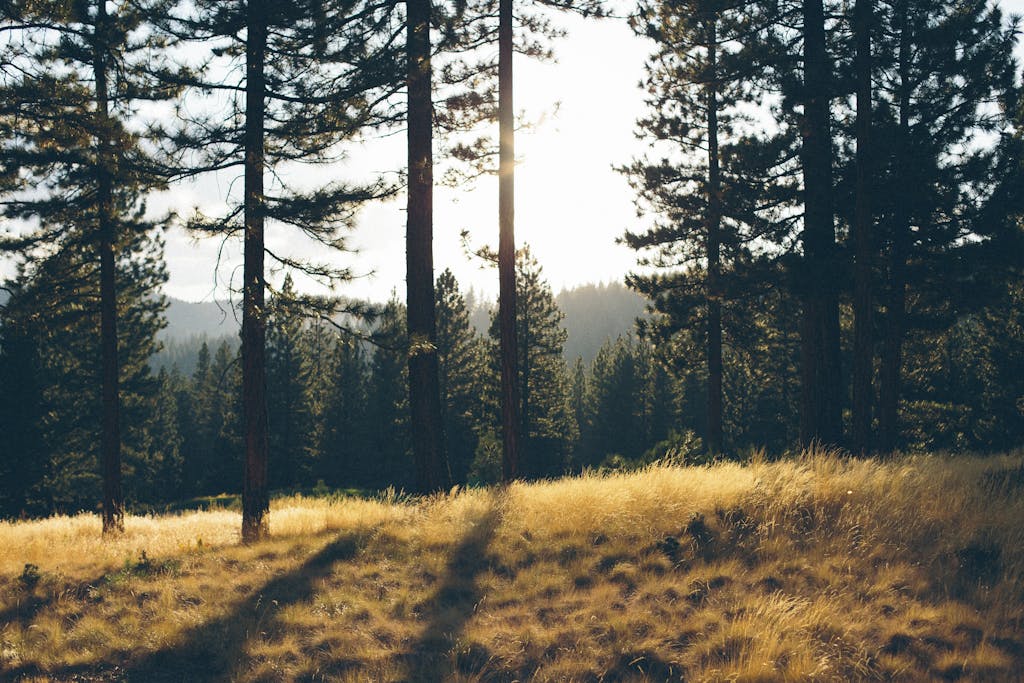
A pine tree is made of many generations, and there’s the moon and the stars in her. So, you bow to that pine tree. That is a kind of civilization, a way of life. If you learn how to live that kind of life, you don’t need anybody to remind you to take care of the environment. You can do it by yourself. That is the insight you get when you practice no-self. We live that kind of experience. We live our daily lives like that. Then everything we say, everything we write down will be able to touch the hearts of people; because you write from your own insight, and not from the ideas you get from another person. So, writing that book The Art of Consumption is a practice also. The ones who produce for us to consume, and we, who go and buy the products, we all should learn how to consume.
Jo Confino: In the 14 Mindfulness Trainings, it says, “don’t invest or purchase from companies that deplete natural resources, harm the Earth, and deprive others of their chance to live” and also to take a clear stand against oppression and injustice. What should activists do? You said quite rightly, the first thing they need to do is to find their own happiness. But in terms of action in the world, how should people work in terms of speaking against injustice, against oppression? How can they do that in a way that is peaceful and that they’re resolved in themselves?
Thay: You know that the monastics have a 3- month retreat every year and like to have a monastic day every week. We are aware that if we cannot be ourselves, if we don’t have enough brotherhood, sisterhood, and happiness, what we do will not have any meaning. We organize our monastic days in such a way that we can get the nourishment; enough to sustain us as a community, so that we can offer retreats and Days of Mindfulness, a little bit everywhere. This is very clear and we feel that very, very much, we should be ourselves. We should not lose ourselves in too much work. Otherwise, we are not authentic. We are not true in our daily service.
The problem is not to do a lot of things, but to do things forthrightly. We should not have the feeling that we do not do enough to help. We should be sure that what we are doing is well done, and is right.
With that, we can be peaceful; because whatever we do will benefit everyone, even if we are just doing sitting or walking meditation. If you do walking meditation right, you get nourishment and healing in every step. Not only your ancestors in you profit, but the future generations will profit. Without that, you cannot do anything. So, every step is the basic practice. Every breath, every sitting should be true, should be nourishing and healing. So, even if you do a little, like organizing a Day of Mindfulness only, but if you do it with all your heart and with happiness, you are doing everything at the same time.
So, whatever you do for yourself rightly, you are doing for all of us. That’s how I see things. You don’t need to have any complex that you are not doing enough. This is very important. I think to contribute to collective awakening, we have to operate as a community, as a sangha. Even the journalists should have their own sangha, where they can share their suffering and difficulties, their happiness, their hopes and successes. It’s a very important thing. This is very clear in Plum Village that without a sangha, we cannot do anything meaningful.
So, taking refuge in a sangha is a very basic thing. So that business man, he produces in a way that intoxicates people. He doesn’t help himself. He does not help his consumers. We want to change him. But how can we change him? There are many ways. One of the ways is to go to him and say that you can be happier. You can be more relaxed. You can live a life that is not hectic like this. You can have more joy or relaxation. You do not need to be overwhelmed by your worries, your anger, and so on, and you help him. That is one way.
Another way is to tell our friends to consume according to the Five Mindfulness Trainings. Why do we have to buy these things? We will tell them that they should not continue to consume these things. We don’t need them. We need other kinds of products that help us to be healthier. If there is awakening in the ranks of the consumers, then the producer will have to change. Otherwise, he cannot continue. So, we force him to change by not buying what we don’t need.
I can survive very well without these electronic devices. I have more time for myself and for my sangha by not using too much of these electronic devices. We can survive very well without television, even without a telephone, and without reading newspapers. We don’t need to watch the news every day or twice a day. Now, if the newspapers bring us good food, then we will buy them. So, there are many ways. I think if we operate as a sangha, and we work with the grassroots people, we can make change from there. We don’t have to persuade the people on top to change, if that work is not easy.
I think Gandhi was capable of urging his people to boycott a number of things, and he knew how to take care of himself. He knew that during the nonviolent operation, he should take care of himself. He told his partner that we should practice, we should refrain from sexual practice during this time.
We have to practice breathing and preserving ourselves, because this is a hard struggle. He knew about all these things, how to preserve energy, because the struggle is long. So, a spiritual practice is very much needed in an attempt to help society change. This spiritual dimension in the life of an activist is very, very important.
We should arrange ourselves so that there will be more peace and relaxation and healing in our daily life. We should have companions on our path and should have sanghas.
I think the idea of having journalists come together as a community and getting their collective insight and the way to work is very important. In Plum Village, we need monks, nuns in order to do things together. We need to support each other. It’s very clear in Plum Village that if we do not stay together as a community, we cannot do anything. We cannot serve, in the good meaning of the work.
Jo Confino: How are you able to look out in the world with peace when you see so much suffering? There are wars everywhere. Things are not becoming more peaceful. If climate change gets much worse, there’ll be terrible, terrible suffering. How do you maintain your own sense of peace when you see all that going on around you?
Thay: I think our perception of time may help, because for us, it’s a very alarming notion. But for Mother Earth, if she suffers, she knows that she has the power to heal herself. If needed, she will take one hundred million years in order to heal herself. But for us, we think that our time on Earth is only 100 years, and that is why we are impatient.
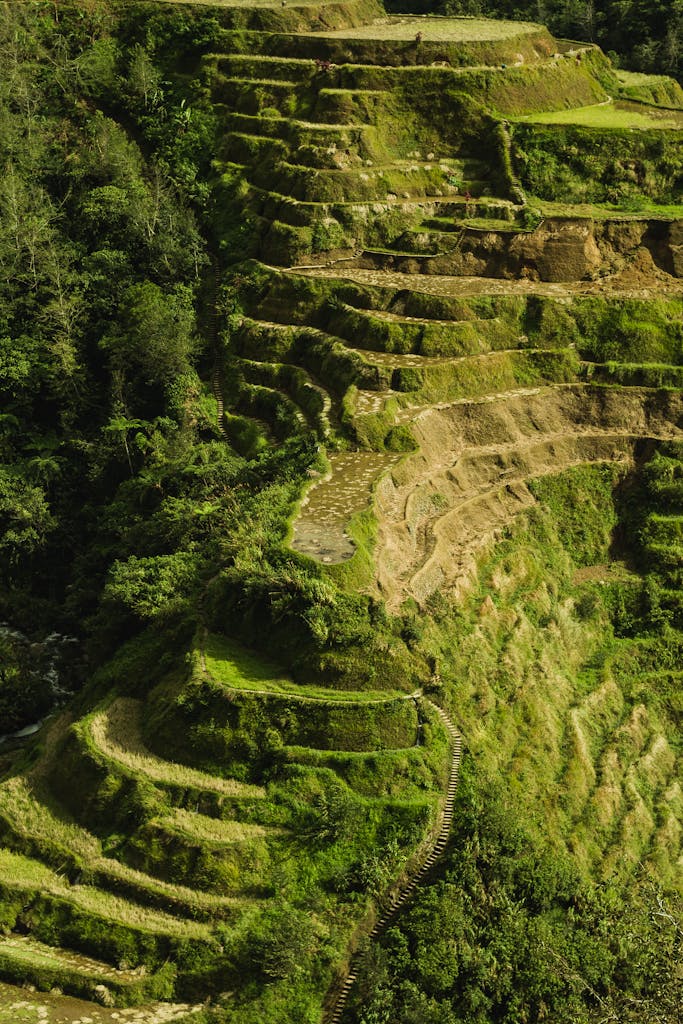
I think the collective karma, the collective ignorance of our race, collective anger and violence of our race may eventually lead to our destruction. We have to learn to accept that. Or maybe Mother Earth will produce a great being sometime in the next decades, so that person will tell us what to do in order to avoid this catastrophe. We don’t know. Mother Earth is very talented. She has produced Buddhas, Bodhisattvas, great beings.
So, take refuge in Mother Earth, surrender to her, and ask her to heal us, to help us.
We have to accept that the worst can happen, that most of us will die as a species and many other species will die also. Mother Earth will be capable after maybe a few million years to bring us out again, this time wiser. We are very intelligent, but we have to learn how to be better.
First of all, to love Mother Earth. When you practice mindfulness, and when you look at the sun during your walking meditation, mindfulness of the body in the body helps you to see that the sun is in you. Without the sun there’s no life at all. Suddenly you get in touch with the sun in a different way. You see the relationship between you and the sun change. Even the sun is embracing you as a father. That is the power of mindfulness, bringing insight. Before, you saw the sun as something very far away, not having too much connection with you. But in fact your connection is very, very deep. You are a child of the sun. You come from the sun. That is true with the Earth also.
You walk in such a way that you see that your relationship with the Earth is so deep and that the earth is in you.
This is not something very difficult. It’s much less difficult than philosophy. If you can walk like that the relationship between you and Mother Earth will change drastically. Maybe you can feel that Mother Earth is in you. You are Mother Earth. Then you are no longer afraid of dying, because the Earth is not dying. You might be reproduced in a better form, in a more beautiful form. It’s like a wave. A wave appears and disappears and appears again. Why should a wave be able to die? So, that kind of insight can come when you have a good relationship. I don’t think that you need to be a philosopher in order to feel that way. Every one of us can see the connection.
Jo Confino: Dear Thay, thank you so much for your time. We really, really appreciate it.
The Way Out is In – Live Podcast – April 5, London
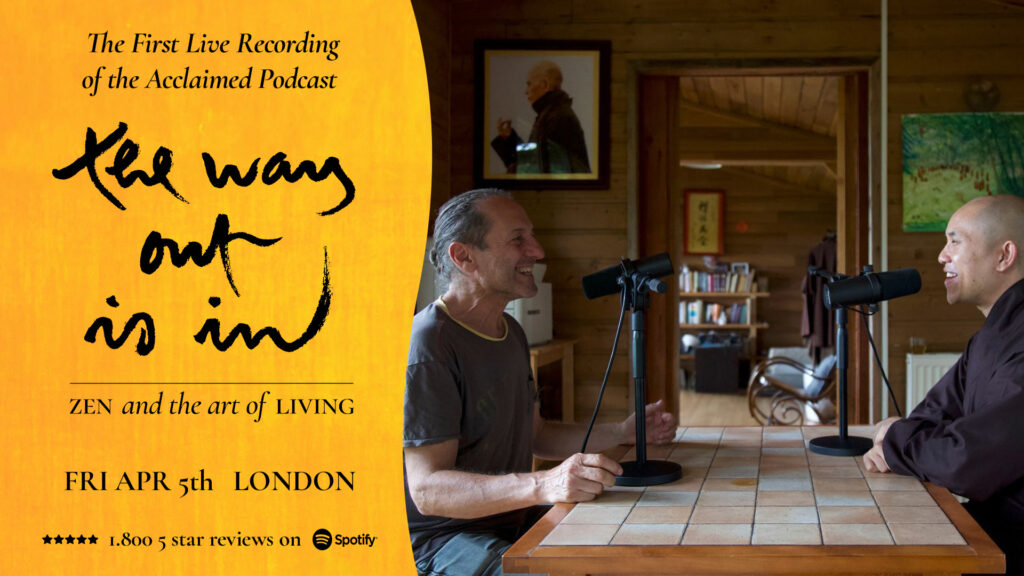



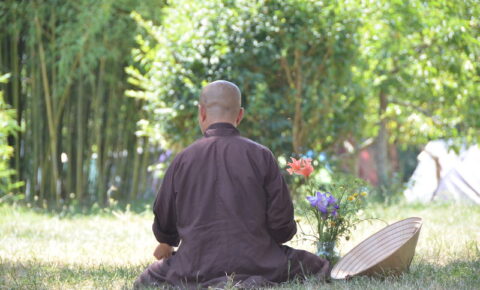
Share Your Reflections